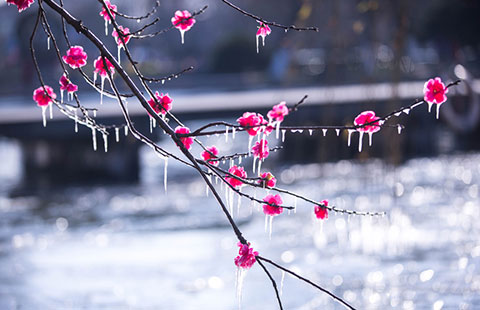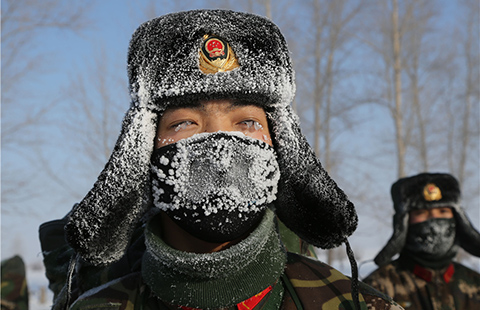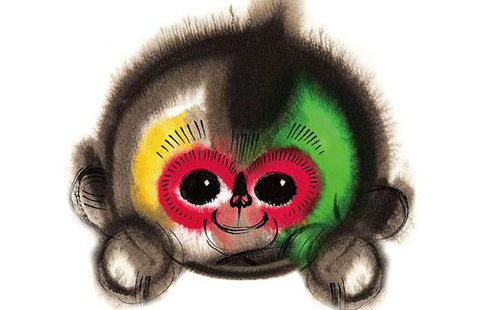


|
'The Venice of the Orient', as Hangzhou is sometimes called, has plenty of water resources and favorable weather for growing tea trees. Photos Provided to China Daily |
|
A man dries tea. The West Lake Longjing 'Tea-stirring King' contest will be held at this year's tea culture expo. Hong Lin / for China Daily |
|
Locals pick Longjing tea in Hangzhou. The local government is promoting the city as China's 'Tea Capital'. Chen Hailin / for China Daily |

Upcoming event to showcase city's legacy as hub for traditional Chinese beverage
Tea sellers are preparing to release their pre-Qingming tea varieties, the best tea collected in early April, in anticipation of the upcoming 2012 China Hangzhou West Lake International Tea Culture Expo, which is set to once again bring out the best of tea culture in Hangzhou, Zhejiang province, said local officials.
Tea and its related customs have been involved in shaping and developing the city's key features for 1,500 years. Among its celebrated types of tea, Longjing, the Dragon Well Tea, is the most renowned and pricey.
Once the tea is soaked in fresh-boiled water, a sweet woodsy aroma rises out. Its leaves bloom like flower buds and bounce slightly up and down, which makes the brewing process itself a sight to behold.
Longjing tea is an inseparable part of the city's cultural legacy, say local leaders. One of the most famous pieces of folklore related to Longjing tea is a tale about when Emperor Qianlong, who reigned from 1711 to 1799, visited Hangzhou.
According to folk legend, the emperor randomly arrived at a tea garden underneath the Lion-shaped Mountain in the Hangzhou suburbs. Amused by the girls who were busy gathering tea leaves there, he begun to pick some himself. Just after scooping up a handful of leaves, a messenger arrived with news that his mother had fallen ill.
Without thought, Qianlong stuffed the tea into his pocket and rushed back to Beijing to see his mother. The mother could smell the leaves in her son's pockets, which refreshed her. As the legend goes, she brewed the dried leaves and got better after drinking them.
The emperor was pleased, so he named the tea trees he saw there the "Royal Trees" and had the tea farmers send him fresh tea every year thereafter.
It was at that time that Longjing tea became a household name.
Long-standing tradition
Hangzhou has been producing tea since the Sui Dynasty (581-618). "The Venice of the Orient", as it is sometimes called, has plenty of water resources and favorable weather for growing tea trees.
Drinking tea is a common practice in daily life. And the city hosts eight official organizations dedicated to researching everything related to tea, from its cultivation and culture to technology and economy.
Tea sommeliers have been listed in Chinese Categorization of Job Professions because of rising interest in restoring traditional teahouses.
However, tea culture was not secular at the beginning. It originated from Buddhist practices in ancient times.
Historians believe the earliest forms of tea cultivation occurred at Buddhist temples in the mountains that surround the West Lake, the city's core sightseeing area.
Some even suspect that Longjing was produced by monks centuries ago who knew and explored ways to brew the tea from fresh leaves.
It is also believed that the Japanese tea-making traditions, including Chado, the tea ceremony, were based on and inspired by customs in the Hangzhou temples.
History has it that Japanese monks came to a temple at the city's Jingshan Mountain to learn about Buddhism between 12th and 13th century, when Hangzhou was the capital.
They brought back not only Buddhist learning but also tea culture and a whole tea service set, from which they developed their own.
When shipping began on the Grand Canal connecting Beijing to Hangzhou, tea culture became popular outside of temples and was introduced into ordinary households in the Tang Dynasty (AD 618-907). The canal helped boost the tea trade and made Hangzhou wealthy.
Soon after, tea became a national beverage, and teahouses began sprouting throughout the city. In the Song Dynasty (AD 420-479), the city was already full of teahouses. Teahouses at the time had varying levels of service tailored to different types of consumers, according to historian.
Since then, tea has been closely tied to seasonal events and familial events in Hangzhou. The people there have dining traditions that go with the tea gathering and tea stirring. In marriage ceremonies, betrothal gifts and the dowry are named after tea. Tea is even a part of the Spring Festival sacrifice, whereas liquor is used in other cities.
Tracing tea culture
It is not difficult to see the evidence of tea culture when traveling through the city. A lot of must-see places in and around the city have been either production areas for fine tea and high-quality mountain spring water or places where legendary figures have stayed for tea.
Hangzhou has always been a famous haunt for intellectuals and poets. According to local tales, the best of ancient poets, Bai Juyi in Tang Dynasty and Su Shi in Song Dynasty, stayed in the city's temples, where they talked with established monks about Buddhism while drinking tea.
The places they stayed became famous, both for the scenery and for the writings left there.
Near an old dragon well, there are still inscriptions said to be left by Su Shi. The poet stayed in Hangzhou for years. There he created many of his most beautiful verses, invented a dish of stewed cubic marbled pork that was named after him and made friends with a Buddhist master.
Tea is also central to Hangzhou cuisine, as exemplified by the dish Stir Fried Shrimp with Longjing Tea.
(China Daily 03/30/2012 page12)







